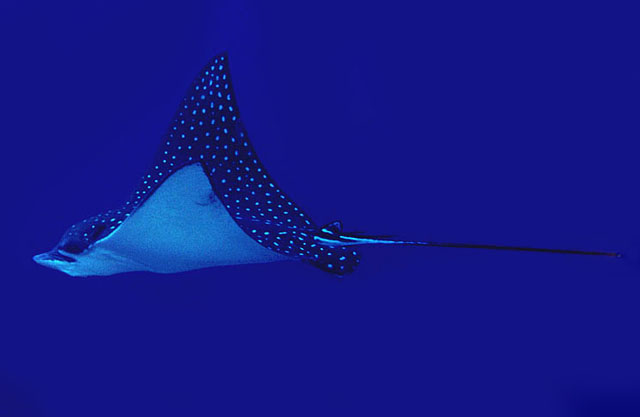| Myliobatidae (Eagle and manta rays), subfamily: Myliobatinae |
| 330 cm WD (male/unsexed); max.weight: 230 kg |
|
benthopelagic; depth range 1 - 80 m, amphidromous |
| Atlantic and Eastern Central Pacific. |
|
Dorsal spines (total): 0-0; Dorsal soft rays (total): 0-0; Anal spines: 0-0; Anal soft rays: 0-0. An eagleray with a long snout, flat and rounded like a duck's bill, a thick head, and a pectoral disc with sharply curved, angular corners, and no caudal fin; jaws usually with single row of flat, chevron-shaped teeth (Ref. 5578). Each tooth a crescent-shaped plate joined into a band (Ref. 26938). Numerous white spots on black or bluish disc; white below (Ref. 5578). Long whiplike tail, with a long spine near the base, behind small dorsal fin. No spines on disk (Ref. 7251). |
| Commonly found in shallow inshore waters such as bays and coral reefs but may cross oceanic basins (Ref. 9862). Benthopelagic, found near land at 1-60 m (Ref. 58302). Sometimes enters estuaries (Ref. 6871). Swims close to the surface, occasionally leaping out of the water, or close to the bottom (Ref. 3175). Frequently forming large schools during the non-breeding season (Ref. 7251). Feeds mainly on bivalves but also eats shrimps, crabs, octopus and worms, whelks, and small fishes (Ref. 9862). Ovoviviparous (Ref. 50449). Flesh edible (Ref. 30573). Over 3 m disc width and up to 880 cm total length if the long tail is undamaged (Ref. 30573). Bears young in litters of 2-4 (Ref.58048,Ref. 26938). Tail used as a decorative item (Ref. 27550). Common catch of the demersal tangle net, bottom trawl, inshore gillnet and, to a lesser extent, demersal longline fisheries. Utilized for its meat and cartilage (Ref.58048). |
|
Near Threatened
(Ref. 96402)
|
| traumatogenic |
|
Source and more info: www.fishbase.org. For personal, classroom, and other internal use only. Not for publication.
Page created by Jen, 05.08.02,
php script by kbanasihan 06/09/2010 ,
last modified by
dsantos, 20/08/10

